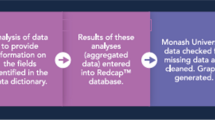Abstract
Background
To optimize the postoperative phase following bariatric surgery, the enhanced recovery after bariatric surgery pathway (ERABS) has been developed. The aim of ERABS is to create a care path that is as safe, efficient and patient-friendly as possible. Continuous evaluation and optimization of ERABS are important to ensure a safe treatment path and may result in better outcomes. The objective of this study was to compare the clinical outcomes of patients undergoing bariatric surgery over 2014–2017, during which the ERABS protocol was continuously evaluated and optimized.
Methods
This is a retrospective cohort study. Data were collected from patients undergoing a primary Roux-en-Y gastric bypass or sleeve gastrectomy between January 2014 and December 2017. Outcomes were early complications, unplanned hospital revisits, readmissions, duration of surgery and length of hospital stay.
Results
2889 patients underwent a primary bariatric procedure in a single center. There was a significant decrease in minor complications over the years from 7.0 to 1.9% (p < 0.001). Hospital revisit rates decreased after 2015 (p < 0.001). Readmission rates decreased over time (p < 0.001). The mean duration of surgery decreased from 52 (in 2014) to 41 (in 2017) minutes (p < 0.001). Median length of hospital stay decreased from 1.8 to 1.5 days in 2015 (p = 0.002) and remained stable since.
Conclusion
An improvement of the ERABS protocol was associated with a decrease in minor complication rates, number of unplanned hospital revisits and readmission rates after primary bariatric procedures.





Similar content being viewed by others
References
Finucane MM, Stevens GA, Cowan MJ, Danaei G, Lin JK, Paciorek CJ et al (2011) National, regional, and global trends in body-mass index since 1980: systematic analysis of health examination surveys and epidemiological studies with 960 country-years and 9.1 million participants. Lancet (Lond, Engl). 377(9765):557–567
Neovius M, Narbro K, Keating C, Peltonen M, Sjoholm K, Agren G et al (2012) Health care use during 20 years following bariatric surgery. JAMA 308(11):1132–1141
Kehlet H (1997) Multimodal approach to control postoperative pathophysiology and rehabilitation. Br J Anaesth 78(5):606–617
Dogan K, Kraaij L, Aarts EO, Koehestanie P, Hammink E, van Laarhoven CJ et al (2015) Fast-track bariatric surgery improves perioperative care and logistics compared to conventional care. Obes Surg 25(1):28–35
Elliott JA, Patel VM, Kirresh A, Ashrafian H, Le Roux CW, Olbers T et al (2013) Fast-track laparoscopic bariatric surgery: a systematic review. Updat Surg 65(2):85–94
Lemanu DP, Singh PP, Berridge K, Burr M, Birch C, Babor R et al (2013) Randomized clinical trial of enhanced recovery versus standard care after laparoscopic sleeve gastrectomy. Br J Surg 100(4):482–489
Mannaerts GH, van Mil SR, Stepaniak PS, Dunkelgrun M, de Quelerij M, Verbrugge SJ et al (2016) Results of implementing an enhanced recovery after bariatric surgery (ERABS) protocol. Obes Surg 26(2):303–312
Thorell A, MacCormick AD, Awad S, Reynolds N, Roulin D, Demartines N et al (2016) Guidelines for perioperative care in bariatric surgery: enhanced recovery after surgery (ERAS) society recommendations. World J Surg 40(9):2065–2083
Malczak P, Pisarska M, Piotr M, Wysocki M, Budzynski A, Pedziwiatr M (2017) Enhanced recovery after bariatric surgery: systematic review and meta-analysis. Obes Surg 27(1):226–235
Brethauer SA, Kim J, El Chaar M, Papasavas P, Eisenberg D, Rogers A et al (2015) Standardized outcomes reporting in metabolic and bariatric surgery. Surg Obes Relat Dis 11(3):489–506
Fried M, Yumuk V, Oppert JM, Scopinaro N, Torres A, Weiner R et al (2014) Interdisciplinary European guidelines on metabolic and bariatric surgery. Obes Surg 24(1):42–55
van Mil SR, Duinhouwer LE, Mannaerts GHH, Biter LU, Dunkelgrun M, Apers JA (2017) The standardized postoperative checklist for bariatric surgery; a tool for safe early discharge? Obes Surg 27(12):3102–3109
Major P, Wysocki M, Dworak J, Pedziwiatr M, Pisarska M, Wierdak M et al (2018) Analysis of laparoscopic sleeve gastrectomy learning curve and its influence on procedure safety and perioperative complications. Obes Surg 28(6):1672–1680
Poelemeijer YQM, Liem RSL, Nienhuijs SW (2018) A Dutch nationwide bariatric quality registry: DATO. Obes Surg 28(6):1602–1610
Author information
Authors and Affiliations
Corresponding author
Ethics declarations
Disclosures
Drs. Leeman, van Mil, Biter, Apers, prof. Verhoef and Dr. Dunkelgrun have no conflicts of interest or financial ties to disclose.
Ethical approval
All procedures performed in studies involving human participants were in accordance with the ethical standards of the institutional and/or national research committee and with the 1964 Helsinki declaration and its later amendments or comparable ethical standards. This study was approved by the Dutch medical ethical committee (METC).
Informed consent
Informed consent was obtained from all individual participants included in the study.
Additional information
Publisher's Note
Springer Nature remains neutral with regard to jurisdictional claims in published maps and institutional affiliations.
Rights and permissions
About this article
Cite this article
Leeman, M., van Mil, S.R., Biter, L.U. et al. Reducing complication rates and hospital readmissions while revising the enhanced recovery after bariatric surgery (ERABS) protocol. Surg Endosc 35, 612–619 (2021). https://doi.org/10.1007/s00464-020-07422-w
Received:
Accepted:
Published:
Issue Date:
DOI: https://doi.org/10.1007/s00464-020-07422-w




